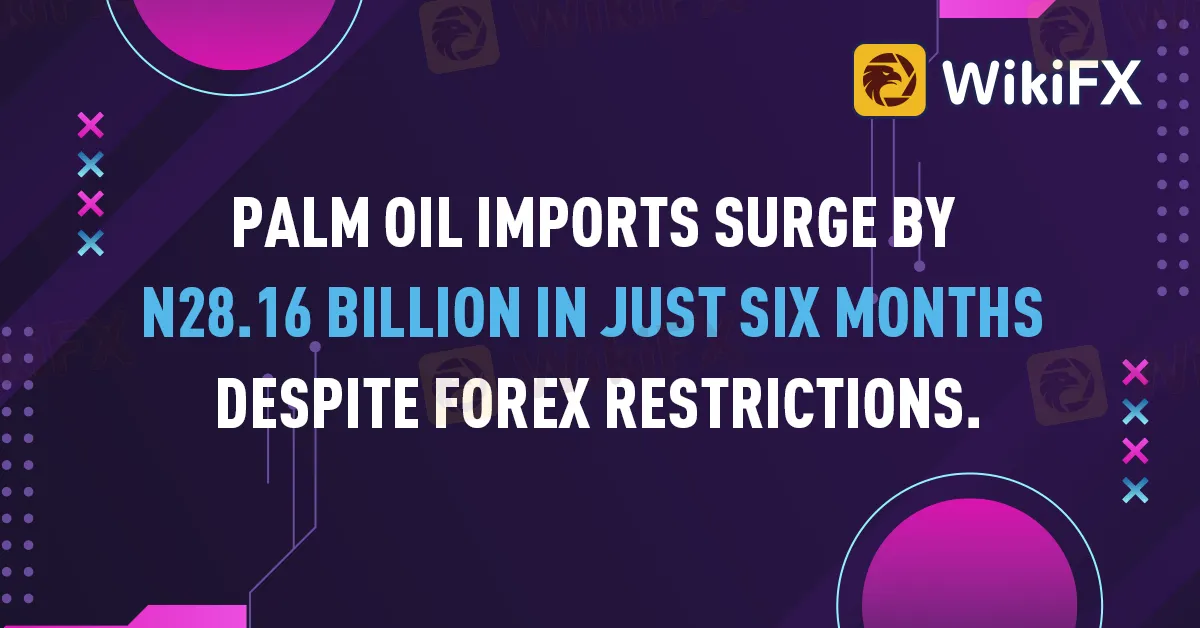WikiFX Spring Festival Message | Grounded in Transparency, Walking with Trust
As the Lunar New Year approaches, renewal is in the air. It is a moment to bid farewell to the old, welcome the new, and reflect while moving forward.
简体中文
繁體中文
English
Pусский
日本語
ภาษาไทย
Tiếng Việt
Bahasa Indonesia
Español
हिन्दी
Filippiiniläinen
Français
Deutsch
Português
Türkçe
한국어
العربية
Abstract:In the first half of 2022, Nigeria imported palm oil worth N28.16 billion as the price of agricultural products arriving in the nation continued to rise. The Central Bank of Nigeria (CBN) has banned the import of palm oil, which is one of the 41 goods, for foreign exchange purposes. This suggests that importers should obtain their foreign currency through alternative channels, such the black market.

In the first half of 2022, Nigeria imported palm oil worth N28.16 billion as the price of agricultural products arriving in the nation continued to rise. The Central Bank of Nigeria (CBN) has banned the import of palm oil, which is one of the 41 goods, for foreign exchange purposes. This suggests that importers should obtain their foreign currency through alternative channels, such the black market.
The National Bureau of Statistics (NBS) reported that foreign trade in goods increased by 5.2 percent during the second quarter of the year (Q2 2022) compared to the same time in 2021, when it recorded a value of N26.77 billion.
According to the report posted on the official website of the country's statistical bureau, imports of palm oil increased by 8.3 percent to N14.64 billion in Q2 2022 from N13.52 billion in the prior quarter. The countries from which the product known as “Crude Palm Oil” was mostly imported were West Africa and Asia.
In Q2 2022, the nation imported palm oil for N14.64 billion from Cote d'Ivoire, while Malaysia and China supplied the product for N13.50 billion and N0.02 billion in Q1 2022, respectively. The largest economy in Africa imported N26.77 billion in palm oil in Q2 2021—N15.09 billion from Singapore and N11.68 billion from India.
Nigeria's importation of agricultural commodities increased during the periods, rising from N1.094 trillion in HY 2021 to N1.105 trillion in HY 2022, or 10% more. Nigeria bought wheat worth N131.54 billion in Q2 2022 compared to N130.60 billion in Q1 2022, in addition to palm oil.
The US and Lithuania contributed N70.67 billion and N60.87 billion, respectively, to the Q2 2022 wheat importation. In Q1 2022, Nigeria received N130.6 billion from the US and N59.04 billion from Argentina, replacing N71.56 billion from Russia and N59.04 billion from Ukraine, its usual suppliers, which have been at war with each other since February 2022.
The US, Canada, Argentina, and Lithuania provided the majority of the Q2 2021 wheat supplies, amounting to N218 billion. In Q2 2022, frozen food products (blue whitings) cost N13.39 billion and N7.31 billion, respectively, to import from Russia and the Netherlands.
The overall value of agricultural imports during the second quarter of 2022 was N454.45 billion, or 8.55 percent of all imports during the quarter. This represents a 4.76 percent increase over the N443.36 billion value recorded in Q1 2022 and a 13.70 percent increase over the N408.49 billion value recorded in Q2 2021, according to the NBS's report.
Dr. Muda Yusuf, CEO of the Centre for the Promotion of Private Enterprise (CPPE), claimed that the palm oil produced in Nigeria is woefully insufficient and that consumers would pay any price to import the product if it increased their profits. According to Yusuf, the immediate former director-general of the Lagos Chamber of Commerce and Industry (LCCI), “when items are expensive, it has a way of helping the manufacturers because they will change their prices to maximize their profit”.
Emmanuel Ebong, the owner of a medium-sized palm oil processing company, claimed that the NBS data did not accurately reflect the value of the product that is imported into the nation.
Palm oil is trafficked across the border, especially from Cameroon and the Benin Republic. Transporters using inland waterways to travel between Nigeria and its neighbors do a brisk business. They are the actual suppliers of the commodities to huge manufacturing companies.
According to Benard Okata, the deputy director of the department of agriculture in the Ministry of Agriculture and Rural Development, Nigeria imports oil palm for about $500 million a year to fill the market.
In November 2020, an international non-governmental organization called Solidaridad hosted a national workshop on oil palm in Abuja. At that time, Okata stated that although Nigeria needs around three million metric tonnes of palm oil locally, it only produces about 1.02 metric tonnes of oil palm.
So, he said, there is a gap. To fill this deficit, we import, and up until now, Nigeria has spent around $500 million yearly on imports.
He remembered that the governor of the Central Bank of Nigeria (CBN), Godwin Emefiele, had lamented the fact that Nigeria continued to import palm oil despite the country's South-South and South-East regions having enough arable land to do so.
Billy Ghansah, the agriculture coordinator for Okomu Oil Palm Company, had stated at the event that Nigeria needs to plant roughly 100,000 hectares of oil palm in order to replace the current gaps in its palm oil production.
The agricultural expert refuted the assertion that Asian nations came to Nigeria to steal its oil palm seeds by pointing out that Nigeria didn't take use of the basic oil palm growing techniques that were created in Africa.
Presco Plc increased their revenue from N23.89 billion to N41.11 billion in 2021. While its assets climbed from N31 billion to N48 billion, post-tax profit increased to N19.82 billion in FY 2021 from N5.26 billion. The aggregate market capitalization of the two businesses, which manage fully integrated agro-industrial complexes, is N322 billion.

Disclaimer:
The views in this article only represent the author's personal views, and do not constitute investment advice on this platform. This platform does not guarantee the accuracy, completeness and timeliness of the information in the article, and will not be liable for any loss caused by the use of or reliance on the information in the article.

As the Lunar New Year approaches, renewal is in the air. It is a moment to bid farewell to the old, welcome the new, and reflect while moving forward.

As the new moon rises, the month of Ramadan begins. It is a time for reflection, self-discipline, and greater care for family and community. Many people adjust their daily routines, slow down their pace, and focus more on personal and spiritual well-being. However, financial markets do not pause for holidays.

WikiFX Elite Club Focus is a monthly publication specially created by the WikiFX Club for its members. It highlights the key individuals, perspectives, and actions that are truly driving the forex industry toward greater transparency, professionalism, and sustainable development.

WikiFX Elite Club Focus is a monthly publication specially created by the WikiFX Elite Club for its members. It highlights the key figures, perspectives, and actions that are truly driving the forex industry toward greater transparency, professionalism, and sustainable development.
